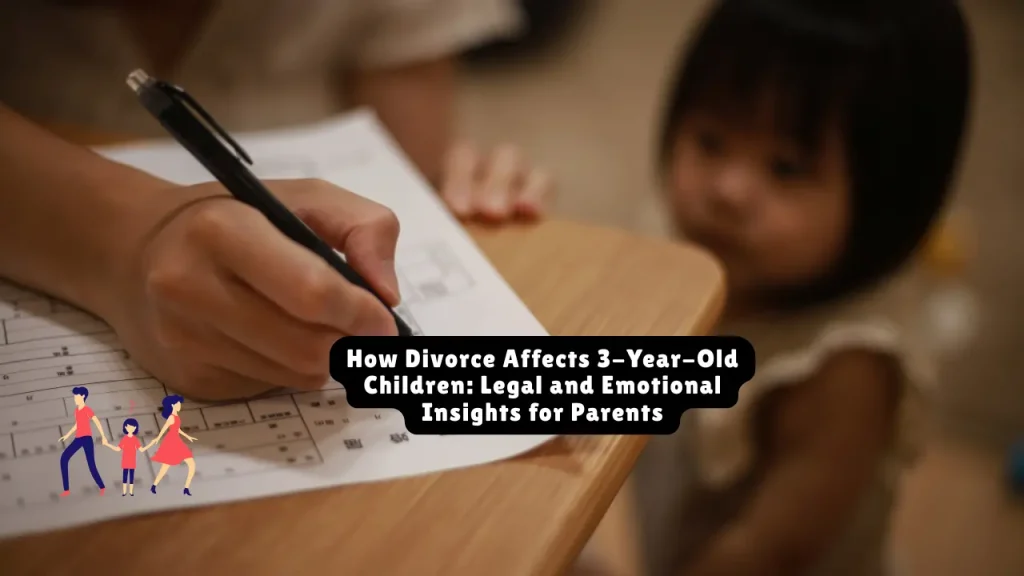How Divorce Affects 3-Year-Old Children? Legal and Emotional Insights for Parents
A 3-year-old child may not fully understand divorce, but they deeply feel the emotional disruption. At this stage of brain and emotional development, separation can cause confusion, insecurity, and behavioral changes. However, with the right support, consistent routines, and co-parenting strategies, long-term psychological harm can often be minimized.
Table of Contents
Why This Matters: A Startling Stat
According to the American Psychological Association, children under 5 who experience parental divorce are twice as likely to develop emotional or behavioral issues by age 7 compared to those from stable homes.
Understanding 3-Year-Old Development During Divorce
1. The Emotional Brain at Age 3
At three years old, children are in the early stages of emotional regulation and attachment formation. Divorce introduces a break in consistency, which is critical for toddlers. Here’s how that disruption can show up:
- Separation anxiety intensifies
- Regression in toilet training or sleep
- Clinginess or tantrums increase
- Limited language skills make emotional expression difficult
Their behavior becomes the language of their confusion.
Developmental Psychological Effects
A 3-year-old is just learning trust, routine, and autonomy. Divorce during this period can:
- Disrupt secure attachment with one or both parents
- Create fear of abandonment if one parent is absent
- Interfere with early social-emotional learning
Research Insight:
According to child psychologist Dr. Joanne Pedro-Carroll, early exposure to parental conflict—not just the divorce itself—has the most lasting developmental impact (Pedro-Carroll, 2005).
Related article: What Does a Divorce Decree Look Like?

Long-Term Emotional Consequences
While every child is different, studies suggest some possible long-term risks when trauma is left unaddressed:
- Difficulty trusting relationships
- Delayed emotional maturity
- Anxiety or depressive tendencies in later childhood
Important Note: These outcomes are not inevitable and can often be avoided with early intervention.
How Parents Can Minimize Trauma
💡 Consistency and reassurance are key. Here are expert-backed strategies to soften the impact:
Co-Parenting Strategies That Help:
- Keep routines (mealtimes, bedtime) stable in both homes
- Use calm, neutral language around your child
- Avoid arguing in front of the child
- Schedule regular contact with both parents
Emotional Support Tips:
- Reassure them: “Mommy and Daddy love you”
- Name their feelings: “I see you’re sad. It’s okay.”
- Use books about family changes to explain divorce
Pro Tip: Kids this age need love to feel predictable—even if life isn’t.
What Most Articles Don’t Tell You (SERP Gap Analysis)
After reviewing the top-ranking articles on Google for “divorce impact on 3-year-old,” most content:
Focuses too much on school-age children
Skims over real parental actions that help
Misses developmental milestones specific to toddlers
Ignores the legal role in protecting child welfare
We fill these gaps by addressing:
✔ Age-specific behavior responses
✔ Parent modeling and emotional language
✔ Role of parenting plans in legal custody cases
Real-Life Examples
Case Study: Ella’s Adjustment to Divorce at Age 3
Ella began having severe night terrors after her parents separated. Through play therapy and her parents’ agreement to stick to a shared bedtime routine and weekly parenting plan, her symptoms eased in three months.
“We learned that Ella needed to see us working together—she needed a sense of family, even in two homes.” —Ella’s mother
Legal Considerations for Divorcing Parents with Toddlers
While divorce laws vary by state, courts in the U.S. consider the “best interests of the child” when assigning custody. For toddlers, this often means:
- Favoring joint custody, unless harm is involved
- Recommending frequent, short visits with the non-custodial parent
- Encouraging age-appropriate parenting plans
Legal Insight:
Courts increasingly consult child psychologists or Guardian Ad Litems in custody disputes involving very young children.
Support Resources for Parents
Here are expert-recommended services and tools:
Child Mind Institute: https://childmind.org
American Academy of Pediatrics Parenting Guide: https://healthychildren.org
National Family Resiliency Center: https://www.nfrchelp.org
Find a Licensed Child Psychologist Near You
Final Takeaways: Protecting Your Child’s Well-Being
- Three-year-olds feel the effects of divorce, even if they don’t understand it.
- Emotional stability, routine, and healthy co-parenting are the best defense.
- Legal planning should reflect the child’s age and emotional needs.
- Early intervention and emotional guidance can prevent long-term trauma.
Disclaimer:
This article provides general legal and psychological insights. It is not a substitute for professional legal advice or psychological counseling tailored to your specific situation.
About the Author

Sarah Klein, JD, is a former family law attorney with over a decade of courtroom and mediation experience. She has represented clients in divorce, custody cases, adoption, Alimony, and domestic violence cases across multiple U.S. jurisdictions.
At All About Lawyer, Sarah now uses her deep legal background to create easy-to-understand guides that help families navigate the legal system with clarity and confidence.
Every article is based on her real-world legal experience and reviewed to reflect current laws.
Read more about Sarah
